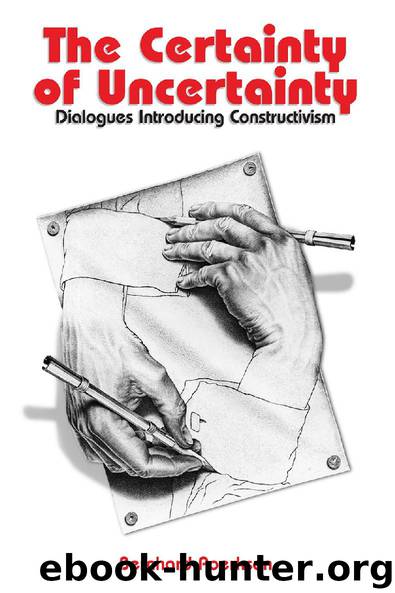The Certainty of Uncertainty by Bernhard Poerksen

Author:Bernhard Poerksen
Language: eng
Format: epub
Tags: Brain, human nature, human culture, constructivism, modern systems theory, von Foerster, Glaserfeld, Maturana, Varela, Roth, Schmidt, Stierlin, Watzlawick, objectivity, brain research, cybernetics, linguistic determination of thought, epistemology, ethical practice, observer, philosophy, scepticism, dogma, ethics of perception, dialogical living, truth, viability, language, knowledge, autopoiesis, cognitive science, Buddhism, subjectivity, consciousness, neurobiology, society, guilt, responsibility, reality
ISBN: 9781845404697
Publisher: Andrews UK Limited 2013
Published: 2013-05-15T00:00:00+00:00
5: We are constructs ourselves
Gerhard Roth on the creation of reality in the brain, on a reality independent from human consciousness, and on the relationship between neurobiology and philosophy
Gerhard Roth (b . 1942) studied philosophy, German philology, and musicology, obtained doctorates in philosophy and in zoology. Since 1976, he has been professor of behavioural physiology at the University of Bremen, since 1997 also founding president of the Hanse-Wissenschaftskolleg at Delmenhorst near Bremen. This College is intended to be a place for the cross-border debate of questions of cognitive science, and a forum for the interdisciplinary exchange between the social and the natural sciences.
Roth’s primary research interest - he is, at present, engaged mainly in brain research - is the encounter of a barely conceivable kind: the encounter between matter and mind, nature and cognition, in the brain of an adult human, an organ weighing about 1300 grams and containing between 100,000 million and a billion neurons. It is still something of a puzzle how the material substance of the neurons affects the immaterial substance of the mind (and vice versa). It is well known that the act of thinking is accompanied by a concert of firing neurons, and that it cannot, therefore, take place without a base that is located in the brain; but as yet, a full understanding of the mechanisms of this interaction has not been achieved.
The basic project, whose contours have - despite the many unsolved problems - become discernible, is committed to unravelling ultimate mysteries that do not repose in remote regions of space or in an external universe but deep within human beings. Their solution is now expected to be delivered by biology. Geneticists are decoding the human genome; neurobiologists are working on a naturalist explanation of cognition and consciousness. Therefore, Roth - director at the Institute of Brain Research at the University of Bremen - calls cognitive neurobiology, with reference to the German terminological tradition, a geisteswissenschaft, “of a special kind”. It investigates how perceptions and mental states take place. It attempts to tackle the key question of the relation between res extensa (matter) and res cogitans (mind; spirit; consciousness) that has remained virulent since René Descartes first formulated it in the 17th century. It describes how a human brain produces the image of an external world with all its riches of sounds, smells, colours and shapes. The link between this research programme as designed by Roth and the cognitive quest of constructivism is immediately apparent: the purpose of cognitive neurobiology is to discover the rules of reality construction as they operate in an organism’s brain.
The unknowability of the absolute
Poerksen: It is commonly assumed that perception is a representation of reality: the knowing mind, it is claimed, mirrors something that is external to it. You insist, however, that our organs of perception and our brains are essentially incapable of apprehending the world in its primordial, its real, gestalt. What are the arguments supporting this claim?
Roth: The first argument is that only very few events in the world can stimulate the sense organs and affect them at all.
Download
This site does not store any files on its server. We only index and link to content provided by other sites. Please contact the content providers to delete copyright contents if any and email us, we'll remove relevant links or contents immediately.
| Anthropology | Archaeology |
| Philosophy | Politics & Government |
| Social Sciences | Sociology |
| Women's Studies |
The History of Sexuality: An Introduction: 1 by Michel Foucault(1341)
The Origins And History Of Consciousness by Erich Neumann(1299)
Ikigai by Yukari Mitsuhashi(1014)
Catching the Big Fish by David Lynch(984)
The Doors of Perception and Heaven and Hell by Aldous Huxley(923)
Wanderlust: A History of Walking by Rebecca Solnit(865)
Psicomagia by Alejandro Jodorowsky(835)
How the Mind Works by Steven Pinker(827)
Heaven and Hell by Aldous Huxley(803)
Other Minds: The Octopus, the Sea, and the Deep Origins of Consciousness by Peter Godfrey-Smith(783)
Happy by Derren Brown(765)
Meeting the Shadow by Connie Zweig(756)
Self Comes to Mind by Antonio Damasio(754)
The Biology of Belief by Bruce H. Lipton(739)
Knowledge Of The Higher Worlds And Its Attainment by Steiner Rudolf(712)
Touching a Nerve by Patricia Churchland(704)
Self Comes to Mind: Constructing the Conscious Brain by Damasio Antonio(699)
I Am a Strange Loop by Douglas R. Hofstadter(682)
How to Grow a Human by Philip Ball(681)
